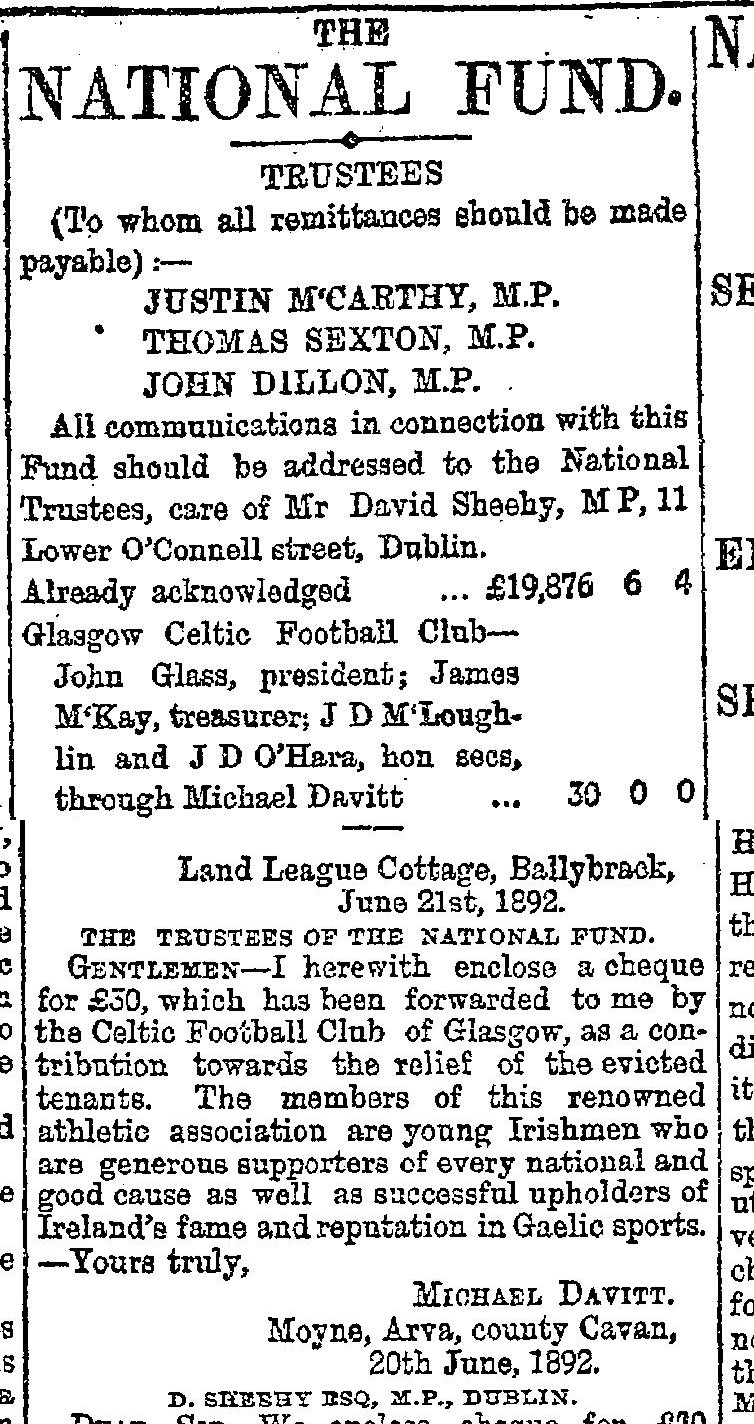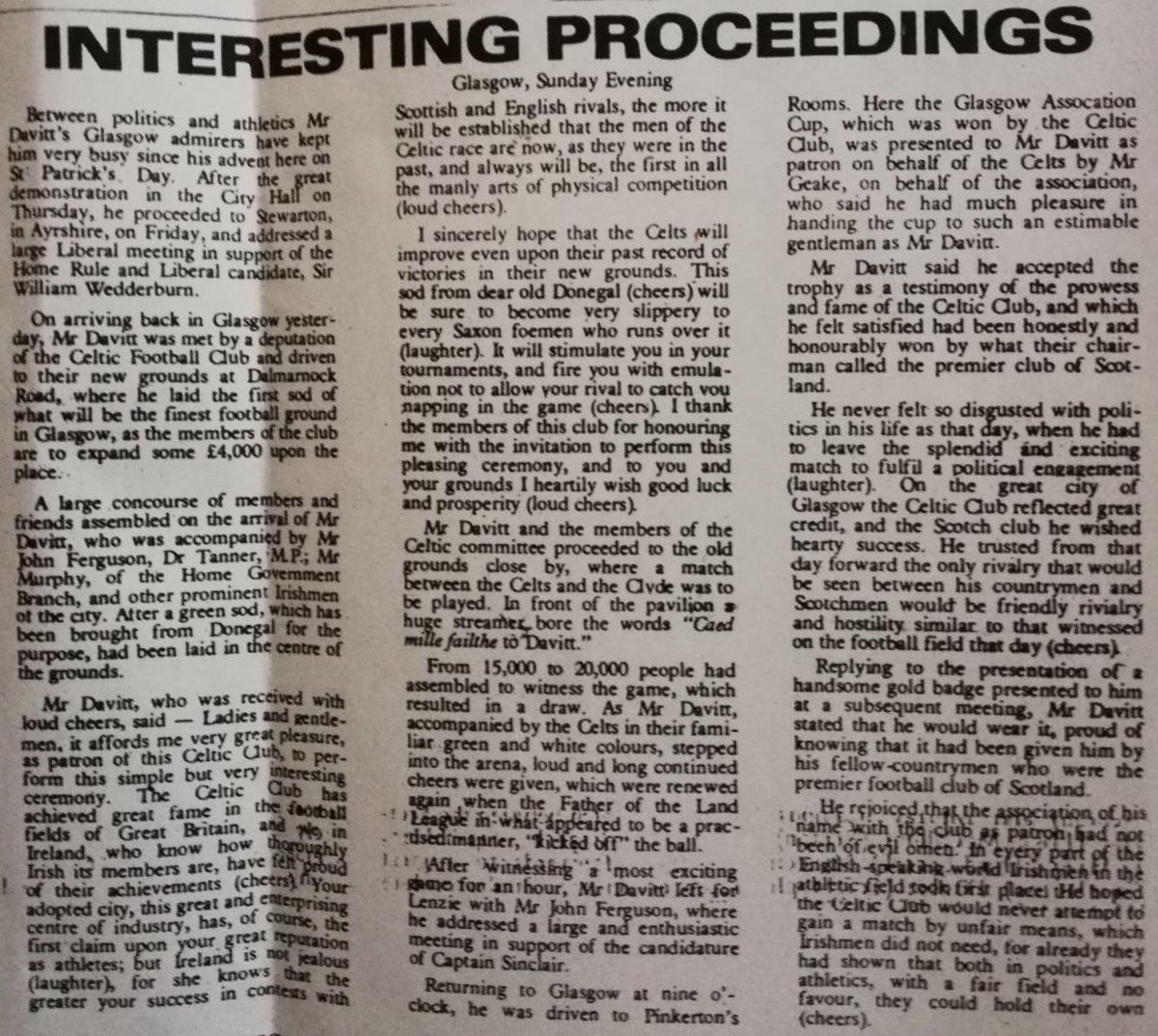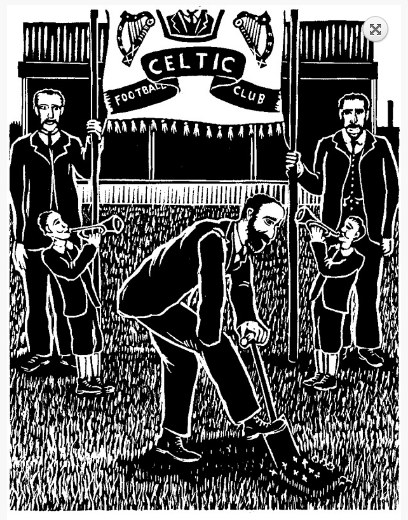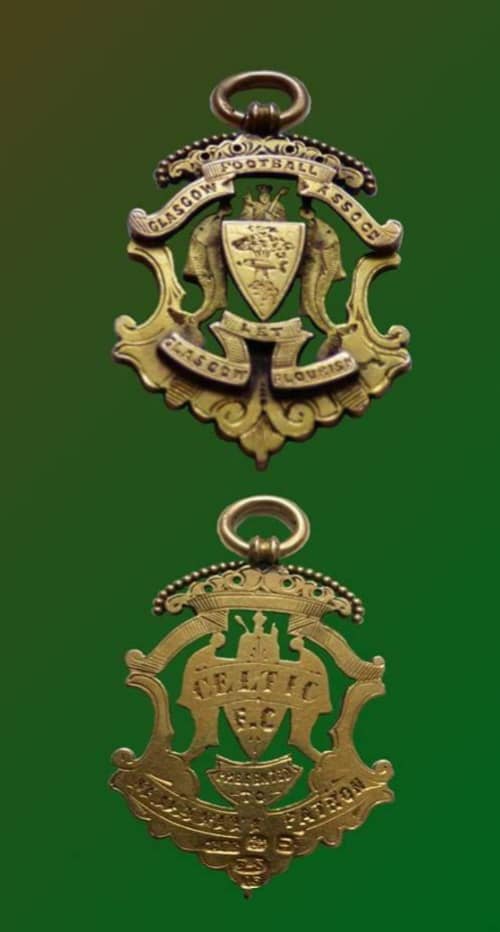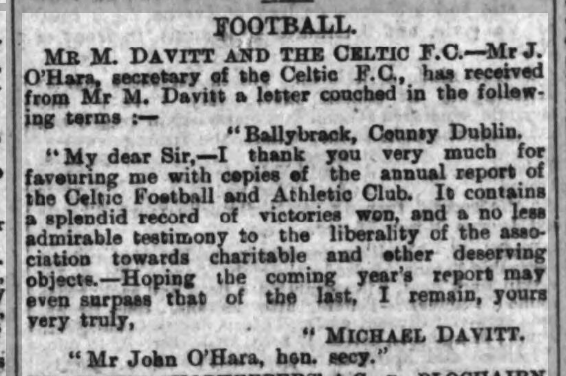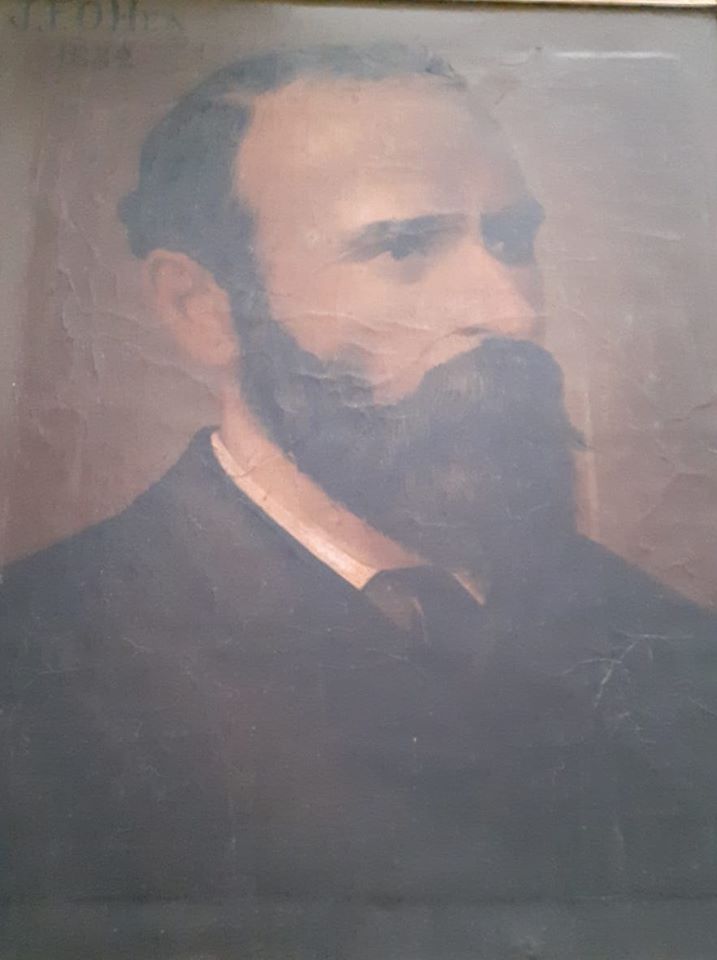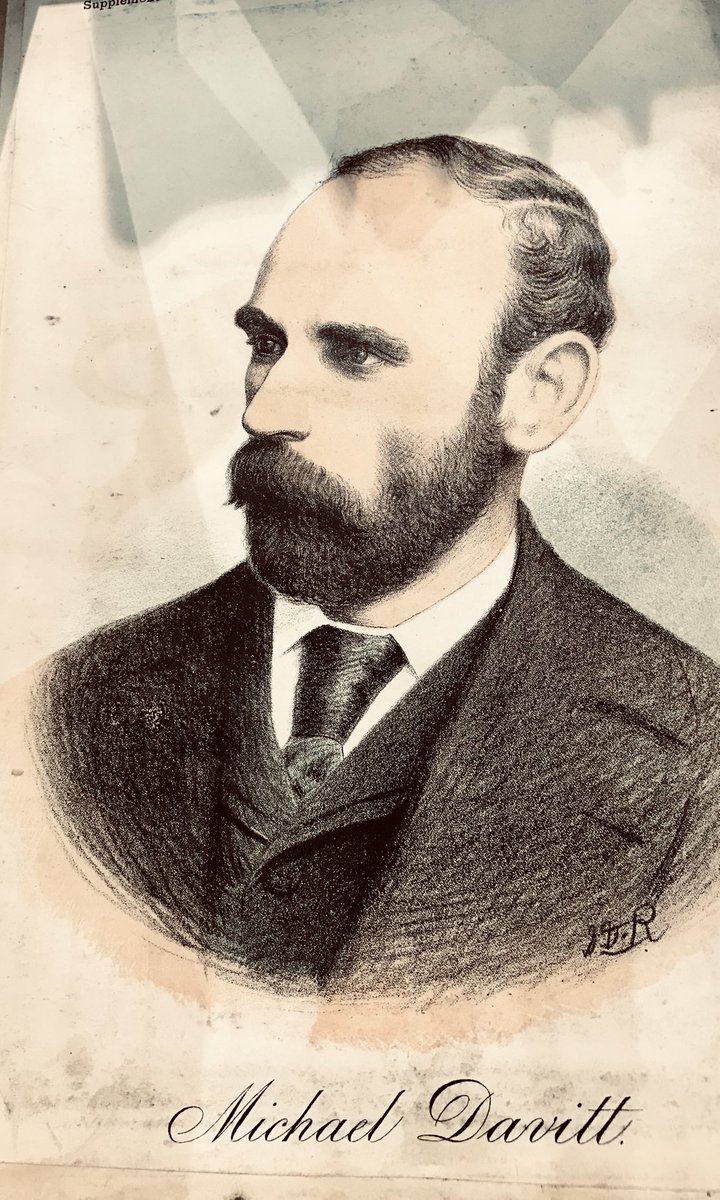| Celtic’s Foundation |
Note: There is also a page on this site for a player named ‘Michael Davitt’ but he is not the same person as this patron. See Michael Davitt (player)
Details
Name: Michael Davitt
Born: 25 March 1846
Died: 30 May 1906
Patron Michael Davitt
County Mayo-born Michael Davitt was an Irish nationalist, social campaigner and founder of the Irish National League.
A man of great integrity and much admired for his committed stance against poverty and the bully boy landlords of Ireland – and also Highland Scotland – Davitt was a figure much revered by the Irish in Glasgow.
It says much about the founding fathers of Celtic that when the club moved to its present home in 1892 Michael Davitt was asked to lay the first sod of turf. Davitt though was never known to have been a follower of football (association version). It was however an important point and was commemorated as below:
“On alien soil like yourself I am here;
I’ll take root and flourish, of that never fear;
And though I’ll be crossed sore and oft by the foes,
You’ll find me as hardy as Thistle or Rose.
If model is needed on your own pitch you’ll have it.”
Apparently it was reported that “He fancied that the green sod conveyed from dear old Donegal would prove so slippery that any Saxon rival who ran over it would fall a cropper!” A curious blessing for he new club.
After taking in Celtic’s league match against Clyde, Davitt later received a gold ‘Glasgow Medal’ at a special banquet from Board member John Glass and it was reported that Davitt said he would be a frequent visitor to watch Celtic and that he would wear this badge with pride! Sadly, the turf was stolen overnight giving rise to a poem which began:
“The curse of Cromwell blast the hand that stole the sod that Michael cut; May all his praties turn to sand – the crawling, thieving scut”!
The club further endorsed Michael Davitt and his fight for social justice when they made him an honourable Patron of the club.
[…requires to be filled up and expanded….]
Links
- Celtic Minded 3 (there is an excellent long article on Michael Davitt & Celtic in this book)
- Celtic Park – First Turf of Grass
Articles
Dublin Notes.
New Zealand Tablet, Volume XXI, Issue 29, 16 November 1894, Page 27
During Michael Davitt’s recent visit to G’asgow he attended a football game given by the famous Celtic Football Club, of which he is the patron, for the benefit of the Parliamentary Fund.
Mr Davitt’s son. a child of five years, and wearing a badge of the club, and a white cap bearing the word ” Celtic ” in gold letters, was led to the centre of the field by his father and the president of the Club, Mr John Glass.
Arrived there Mr Davitt’s little son faced the ‘ball awaiting his attention. Standing in a determined attitude the little gentleman lifted his right foot, and, amid loud cheers, administered to the ball a splendid running kick.
This was the kick-off, and immediately afterwards the contending team, the Celtic and Queen’s Park, entered upon the game. The play, as might be expected from the two leading clubs in the country, proved a fine display, but, notwithstanding the splendid playing on both sides, the match ended in a draw of one goal each.
As a result £60 was handed to Mr Davitt.
The Death of Mr. Michael Davitt
(source: …)
An immense crowd had gathered in t/he neighborhood of St.” Teresa’s Gntfreh, at Clarendon street, some time previous to the arrival of the coffin. When . the hearse, carrying the remains of the illustrious dead, reached the church, heads were reverently uncovered. Meanwhile all parts of the building were filling’ rapidly.
“The remains were received at the church door by the Rev. Father Coen, O.D.C., Prior :’ the Provincial the Very Rev. Father Holland, and members of the community, and the passages through the central aisles were held by the members of the Arch-Confraternity of St. Teresa.
On Friday morning the coffin containing the remains of Mr. Davitt were taken from the side chapel and placed on a catafalque in front of the High Altar. The St. Teresa Chapel, where the remains rested during the night, was draped in black. At ten o’clock Solemn Requiem High Mass was celebrated, and the Office of the Dead recited. The church was crowded with people of all classes. Many of those in the congregation were in tears, and the deepest emotion was shown by all those present.
The funeral left the Carmelite Church, Clarendon street, on Saturday morning a t ten o’clock, for Broadstone terminus. A special train left Broadstone for Foxford, County Mayo, at eleven o’clock, stopping at Claremorris. The train reached Foxford at a quarter to four, almost to the exact minute timed for its arrival. A large concqurse of country people and vehicles of several kinds awaited outside the station. The Rev. P. Hunt, P.P., Straide, and a large number of clergymen were- present.
Amidst a scene of touching impressiveness the coffin was conveyed from the train to the hearse. The funeral procession shortly afterwards started for Straide Graveyard, about five miles distant. The hearse was followed by carriages and other vehicles, countrymen on horseback, cyclists, and many walked the journey. The Davitt family burial place lies beside a beautiful old ruined abbey, said to have been built many centuries ago.
The graveyard itself is that to which Mr. Davitt once ma<le public reference as being one of those in which the bodies of those who died from hunger and disease in the dreadful famine days of the forties were interred in heaps and coffinless.
A few hundred yards distant is the spot, mow marked by two ash trees, where stood the Davitt, homestead from which in 1852 Mr. Davitt’s father and mother were evicted, Mr. Davitt at the time being about six years of age.
The following is the concluding portions of Mr. Davitt’s will :— ‘
Should I die in Ireland, I would wish to be buried at Straide, County Mayo, without any funeral demonstration. If I die in America I must be buried in my mothers grave at Manayunk, near Philadelphia, and on no account brought back to Ireland.
If in any other country (outside of Great Britain) to be buried in the nearest graveyard to where I die, with the simplest possible ceremony.
Should I die in Great Britain, I must be buried at Straide, County Mayo. My diaries are not to be published as such, and in no instance without my wife’s permission ; but en no account must anything harsh or censorious writ/ten in said diaries by me about any person, dead or alive, who has ever worked for Ireland, be printed, published, or used so as to give pain to any friend or relative.
To all my friends I leave kind thoughts ; to my enemies the ‘fullest possible forgiveness ; and to Ireland the undying prayer for the absolute freedom and independence which it was my life’s ambition to try and obtain for her.’
Below: Letter from Michael Davitt upon submitting on Celtic’s behalf a donation to the Irish National Fund, Freeman’s Journal and Daily Commercial Advertiser (Dublin, Ireland), Thursday, June 23, 1892
